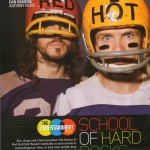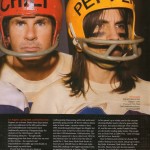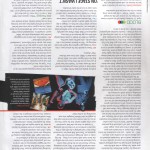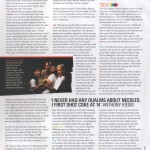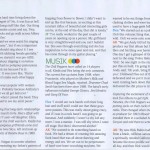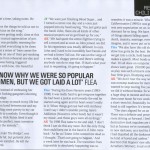Thanks to Invisible Movement for the scans and the transcript.
Los Angeles, spring 2006, and the red hot Chili Peppers are at home. Home these days means some nice addresses in the hilly parts where LA’s multimillionaire entertainers have traditionally parked up. Disappointingly for students of the Chili peppers’ old life – threatening lifestyles – though hardly surprising given that three of the four are now in their forties – the comforts and responsibilities of middle age seem finally to have caught up with them.
It’s not that there’s no sex, drugs or rock’n’roll any more, just that the sex is monogamous, the drugs, if any, are class C and the rock’n’roll more a matter of careful craftmanship than posing with cock socks and generally going mental. Of the 45 million album sales to their name, a quarter relate to their 1991 breakthrough Blood Sugar Sex Magik, but half have come in the five years since they put out their 1999 blockbuster, Californication. The band that appeared to have collectively OD’d in the Nineties now vie with U2 for the title of world No.1.
Their three Hyde Park shows in front of over 250,000 fans in 2004 took more than L 9m, making it the biggest grossing event, as opposed to festival, in history. Their forthcoming ninth studio release, Stadium Arcadium, is a monumental 25-track double CD that speaks eloquently of hard-won maturity.
In his spread, up a windy road in the canyons abutting Malibu beach where he goes surfing most days, bass player Michael “Flea” Balzary, 43, and his new wife, model Frankie Rayder, are devotedly tending baby Sunny. The couple met at Hyde Park in 2004. Flea, “came off stage and fell in love, basically”.
Over in Hollywood central, in a house that used to belong to Cary Grant, the group’s token big bloke, drummer Chad Smith, also 43, and his wife, Nancy, have also become parents recently. As a result they are contemplating moving to an area with more green space, where their baby boy is less likely to be mown down by coachloads of Hollywood tourists.
Guitarist John Frusciante, the youngest at 36, is still living alone off Mulholland Drive in a sort of bungalow built mainly of glass that’s crammed with musical paraphernalia and paintings by Captain Beefheart. But bachelor gear aside, he’s happy at last with his new girlfriend, and though his arms still bear terrible scarring from his lost years as a junkie, he’s on an intense creative roll. Frusciante released six solo albums in the six months up to January 2005 – no, really – and has contributed the lion’s share of the music to the band’s new opus.
And what of the main man, singer, überphilanderer and self-confessed drug monster Anthony Kiedis ? Well, he’s five years sober, miraculously cured of the needle-born hepatitis C he was diagnosed with in the Nineties, and looking more taut and toned than he has any right to, given the years of rigorous abuse he’s put his body through. Forty-three-year-old Kiedis lives in an elegant Thirties gated villa in Benedict Canyon, set in a eucalyptus grove. Since his last girlfriend moved out his only companions here are a couple of Rhodesian ridgeback dogs, a lot of music and books – including a whole shelf containing the complete OED – and some large pictures and framed movie posters. Of the four, he seems the least settled: he rattles around in his sparsely furnished des res and talks of needing to move, “to wipe the slate clean”.
Of the old brotherly connection – and the competitive dare-devilry that went with it – between him and Flea, the best buddy from high school he’s played with for more than 20 years and known for more than 30, the only hint sits parked in the garage. Both men drive Porsche Carreras; he is grey, Flea’s is black. Otherwise there’s little domestic evidence to link them with each other, or with the band whose hedonistic antics, back in the day, made them pretty much the only gang in town. For years, one half of young Los Angeles wanted to be in Red Hot Chili peppers while the other half, it seemed, wanted (and often got) Red Hot Chili Peppers in them. Now they’ve become the elder statesmen of the punk-funk movement; and having lived the life to the limit and beyond, all but one of them – founder member and guitarist Hillel Slovak – has lived to tell it.
Socks and drugs…
From the early exposure of 1988’s Abbey Road EP to 1999’s Californication comeback, via line-up changes and the death of guitarist Hillel Slovak; Anthony Kiedis and Flea have been at the core of the Red Hot Chili Peppers’ explosive funk rock output.
BLOOD
Aged 12, Anthony Kiedis left his mother’s home in Michigan for LA to live with his estranged father, “Spider” Kiedis – a bit-part actor, drug dealer to the stars and an avid womaniser.
Anthony Kiedis “As soon as I moved in with him he became mu role model and hero. He would take me on his pot-smuggling trips, take me to meet his friends and clients in clubs, get me to photograph his girlfriends topless. He even got me cast in a Coca-Cola commercial, which generated friction because then I was making more money than he was.
“What was kind of annoying was the late-night traffic. I was like, ‘Wow, this guy really wants that damn coke.’ One day when I was 15, our solid oak front door was kicked in and a phalanx of guys with shotguns and bulletproof vests and pistols poured in. They were screaming, ‘Freeze! Freeze! Get on the f:loor!’ One of the knuckleheads burrowed a hole into the ceiling of the black closet and found everything – the big rocks of coke, the bags of weed and the huge quaalude jar. They took Dad away but I convinced them that I needed to be at school in the morning.
“It turned out that my dad had a prostitute over a few nights earlier, but she wasn’t his cup of tea. So she stormed out and told the cops that he might be the Hillside Strangler who was terrorising LA at that time.”
Hollywood, a school whose gymnasium featured in the Nirvana video for “Smell Like teen Spirits”. It was here he met the three boys who formed Red Hot Chili Peppers mark one: Hillel Slovak (who died in 1988), Jack Irons and Michael “Flea” Balzary.
AK “About a month into the school year, a tiny, crazy-looking, gap-toothed, big-haired kid came waltzing up. I felt an instant connection to the little weirdo, who said his name was Flea. I usually felt like the leader in most relationships with kids my age because of all the crazy experiences I’d had, Mike [Flea] was painfully shy and insecure and much more sheltered than I had been so I assumed the alpha role. He was into pot when I first met him, so I began to dip into my dad’s stash to satisfy our needs.”
Flea “My mother said that when I came home from school the day I met Anthony, I said, ‘Mom, I’ve finally found someone I can talk to !” We both come from dysfunctional families, we both came to LA in the early Seventies.
“When Anthony and I were kids, we had this special thing where every day we would do crazy stuff, like going hiking in the mountains and eating dirt. Dumb stuff like breaking into people’s houses. We’d flash old ladies. We’d heard that Beverly and Wildwhire was the biggest intersection in the world so we took quaaludes, took off all our clothes and climbed to the top of a billboard on a Saturday night. Silly things like jumping off buildings into pools, until Anthony broke his back, which put a downer on that.”
AK “His situation at home seemed as chaotic as mine. He would regale me with stories about his stepfather, Walter, who had dealt with an alcohol problem and was now a hermit. Mike would never go anywhere without his trumpet. He was first trumpet in the school playing opened me up to a whole other world.”
Flea “I got my love of jazz from my stepfather, who was a jazz musician. I was raised to think that rock was music for ignorant people who didn’t think for themselves. People later took us as this frat-boy party band, but that could not have been further from the truth in the early days. Those were exactly the type of kids that used to make fun of me ! We were these arty punks from Hollywood. I considered myself an intellectual.”
AK “Unlike Flea, who had a real scrapping-brother type relationship with me, Hillel wasn’t competitive. I immediately knew Hillel was at least my equal. He understood a lot about music, he was a great visual artist and he had a sense of self and calm that were just riveting. Plus he was Israeli-Jewish, which seemed very cool to me.”
John Frusciante “When I joined, after Hillel died, I was 18. They were 25 and they’d all grown up together and lived through a lot. I felt I wasn’t standing up to what Hillel had done. They saw me as someone who was just out of high school and they called me ‘greenie’. I was the butt of all the jokes. I wanted to make it so nobody would laugh at me anymore, so I forced myself to grow up probably quicker than I should have. I repressed myself. On this new album I’ve tried to do what I wish I would have done when I was 18.”
SUGAR
Anthony Kiedis has been a heavy drug user and addict for most of his adult life. He cleaned up after the death of Hillel Slovak in 1988 but relapsed five years later. His last spell in rehab was in December 2000 and he has stayed clean since. The band has, at various times, carried three heroin-loving guitarists: Slovak, Dave Navarro and John Frusciante.
AK “I never had any qualms about using needles. I was 14 the first time I shot coke. Twenty seconds later I felt like Superman. I was at one of my dad’s parties watching all the adults shooting up and I badgered them into shooting me up. Back in the Seventies the coke was very strong and very pure, it wasn’t so chemical heavy as it is these days. I would always check the house in the morning to see if there was anything left behind from the night before. There often was. Cocaine inadvertently lec me to heroin. One day I was with my dad around at some adult’s house, and they went out leaving me and a little line on the table. So monkey see, monkey do. I snorted it, and when they came back everyone was geting frantic because unbeknown to me that little line was Chni Whit heroin. But I was fine. I realised that I liked the heroin better than the cocaine. I was high but didn’t feel jittery or nervous. My jaw wasn’t grinding and I wasn’t worried where my next line of coke was going to come from.
“The comedown from shooting coke is horiific and that’s one of the reasons I took heroin; it became the pillow to break that cocaine fall.”
By the time the band got underway in the mid-Eighties, Kiedis was a regular heroin user, a bond he shared with guitarist Hillel Slovak. This deepened during the Chili Peppers’ 1988 European tour and ended when Slovak died of an overdose two weeks after they returned to LA.
AK “A lot of what Hillel and I talked about that summer was drugs and heroin and where we were with our addiction, and what we wanted to do about it. We were still pretty clueless back then as to the nature of the disease. I took Hillel to a meeting once, but he hated to admit he had a problem. On the rain to Norway we agreed the band was going well and we vowed to make a concerted effort to stop drug-taking. In the next breath we joked about Oslo being the heroin capital of Scandinavia. We played Oslo and flew back to L.A. We said our ‘goodbye, be goods’ and both made a beeline for our dealers. I never saw him again. For some disgusting reason, people blamed me for Hillel’s demise because my own addiction had started so much younger.”
Dodging Slovak’s funeral, Kiedis fled to Mexico with his girlfriend to try to kick the habit. In 1994 after a trip to the dentists, during which he was given novocaine, he returned to his druggy ways with a vengeance.
AK “My house was the perfect isolation castle at the top of the hill but the drive downtown to score was always an experience. The Mexican dealers are incredibly aggressive, they’re in your passenger window, they’re in your back window and you have to choose which mad man you’re going to buy from. They’re used to people buying 20 dollars’ worth, but you pull out a wad and tell them you want 500 dollars’ worth ! They can’t keep that much crack in their mouths, which is where they store it, just like the balloons of heroin. So they start hustling and pooling their resources and come to you with a handful of saliva-covered crack. As soon as you hit the pipe: boom. Getting all that serotonin at once is so crazy that you’re liable to stand up, take off your clothes and go walking into the neighbour’s house. On one occasion I did just that. I knocked on the door and said something like, ‘Did I leave my keys in here ?’ She was kind and sweet and three minutes later the feeling evaporated and I realised I was there half-naked, looking for keys that didn’t exist, so I apologised and went back home and hit the pipe again.”
Chad Smith “Anthony is not a party drug user. When he goes on a binge he disappears for weeks at a time. We finished recording the music for One Hot Minute in 1994 but he didn’t get around to the vocals for another year.”
Flea “With John, he lived his junkie years out of the band, and when he came back in 1998 he was straight. I’ve been through my drug phases but Anthony and John are real junkies. When Anthony is like that it’s sad and boring because we become inactive. But luckily he can always straighten up. Anthony has always been the man of fucking steel.”
JF “I decided to be a drug addict after I left the band in 1992 because it gave me the ability to focus on my art and to forget about the rest of the world. There were many times when I could have died. My house burned down once and 6,000 pieces of art, everything I’d worked on, were destroyed. But the things that were bad about that time were bad in a romantic way.”
MUSIK
The Chili Peppers have called on 14 players in all, Kiedis and Flea being the only constants. The current line-up dates from 1998, when Frusciante, who played on Mother’s Milk and Blood Sugar Sex Magik, rejoined. Drummer Chad Smith has been there since 1989. The band’s early influences included George Clinton, Jimi Hendrix and Gang Of Four.
Flea ” I would see rock bands with their long hair and stuff and I could see that these guys were pussies. This was really about going crazy, and is I was in a rock band I was going to go bananas. And suddenly I wasn’t a shy kid any more. I was a maniac. I was still shy when I came off stage. But then I discovered alcohol.”
AK “We wanted to do something based on funk. We had a dream of creating this amazing funk band that was all about dancing and energy and sex. We set out to be perpetrators of hard-core bone-crunching mayhem. We wanted to be sex things from heaven, but we wore clashing clothes and were basically outcasts. We used to have a huge geek following.”
Flea “We started out as a joke. THen one night I felt this volcanic thing that, like, erupted. It was wild. I felt we were onto something.”
AK “We got Andy Gill [of Gang Of Four] to produce our first album but he had moved on by then and his thing was having a hit at all costs. One day I got a glimpse of Gill’s notebook, and next to the song ‘Police Helicopter’ he’d written: ‘Shit’. So one night in the studio Flea said, ‘Let’s put this on hold, I’m going to take a big shiny shit.’ Andy said, ‘Oh yeah, bring that back for me, won’t you’. I followed Flea out of the room. So Flea defecated and we put it in an empty pizza box and went running back down the hallway and delivered the shit pizza to Andy.”
Capturing the excitement of their live shows on disc took five albums to get right. As they entered the Nineties, the Chili Peppers were more famous for putting socks on their cocks than records on the radio. That changed when they hired Rick Rubin as producer for 1991’s Blood Sugar Sex Magik. He installed them in a secluded hacienda in Laurel Canyon and told them to write some songs.
AK “By now Rick Rubin had transformed himself from a brash, caffeine-saturated New Yorker into a spiritually minded Californian. With him we became the most prolific we’d ever been. We’d jam all day, and then Rick would come by and lie on the couch for hours at a time, taking notes. He didn’t miss a beat.”
Flea “With Rick it was the things he told us not to do. He taught us to focus on the song.”
AK “John and Flea were getting really close at this point, based on their mutual appreciation of pot. I was clean and John was probably resenting the fact that I always wanted everything to be clean around me. There was a sense of ‘here comes the narc’ when I’d intrude on one of their pot-smoking scenarios. I rode home from rehearsal one day and the loneliness that I was feeling triggered memories of my time with Ione, this beautiful angel of a girl, when instead of embracing her I was downtown with fucking gangsters shooting speedballs under a bridge.
“I felt I had thrown away so much in my life but I also felt an unspoken bond between me and my city. I started freestyling some poetry in my car and putting the words to a melody. Even though it wasn’t our usual style, Rick Rubin liked it and John came up with the perfect, most inventive chord progression for the melody.”
The resulting song, “Under The Bridge”, was to become a worldwide hit, but guitarist John Frusciante was far from satisfied. He left the band shortly afterwards.
JF “We were just finishing Blood Sugar… and I turned a corner one day and a voice just popped into my head saying, ‘You just gotta quit the band, John, there are all kinds of other musical projects we’ve got lined up for you.”
AK “We had spent the entire Eighties trying to sell a record and as soon as John joined, we did. So his experience was totally different to ours. John and I used to be incredibly fast friends and we had a lovers’ fall out. He was on the verge of a very dark, druggy period and there’s nothing anybody can do to stop that. If that’s what your soul is requesting, it’s going to happen.”
Flea “During the Dave Navarro years [1993-1998] it was really hard to get everyone together. He had been a junkie and towards the end he started using again and his heart wasn’t really in it. When things got real bad with Anthony I can’t say I didn’t consider joining Jane’s Addiction [Navarro’s other band] but it wasn’t my music, and those guys were all on drugs.”
AK “In 1998 Flea came to me and said, ‘I don’t think I can do this any more. But the only thing that could keep me in the band is if John came back.’ As far as I knew John wanted me dead so I thought, ‘That’s not going to happen,’ And a week later he was back. The transition from impossible to absolutely happening was so seamless it was a miracle. When we made Californication [1999] it was great because there was zero expectation on us, we had been dormant for so long. We have a lot of experience of things almost falling apart. We’ve survived death, insanity, marriage, every hurdle you can imagine, and it never put us to bed for good.”
Flea “We also have this old showbiz ethic; every show has gotta be the best. Before every show we get into a circle, hold hands and someone makes a speech. Most bands are too cool for that. It’s all done on computer. Those Hyde Park shows were great. 250,000 people coming to see us play was such a bizarre concept. The same four little guys, thumping away on our stuff.”
AK “We don’t tour the way we used to when it was nonstop madness for months on end. Flea wanted to stop touring five years ago because we did it without breaks. So we decided to take a huge drop in income and tour for three weeks then come home for two weeks and rest. It’s a short-term hit, financially, but it means the band is still together. It’s better for everybody.
“The stars aligned for us on this new record. There was a definite and perceptible love in the room driving us forward . I feel a lot of my destructive dark impulses are in the past now, but as humans we’re constantly being introduced to new darkness, as a tool for learning things. If I had dispelled all the darkness forever, I would be kind of bored and useless.”
Red Hot Chili Peppers’ new album, Stadium Arcadium (Warner), is out on 8 May.

